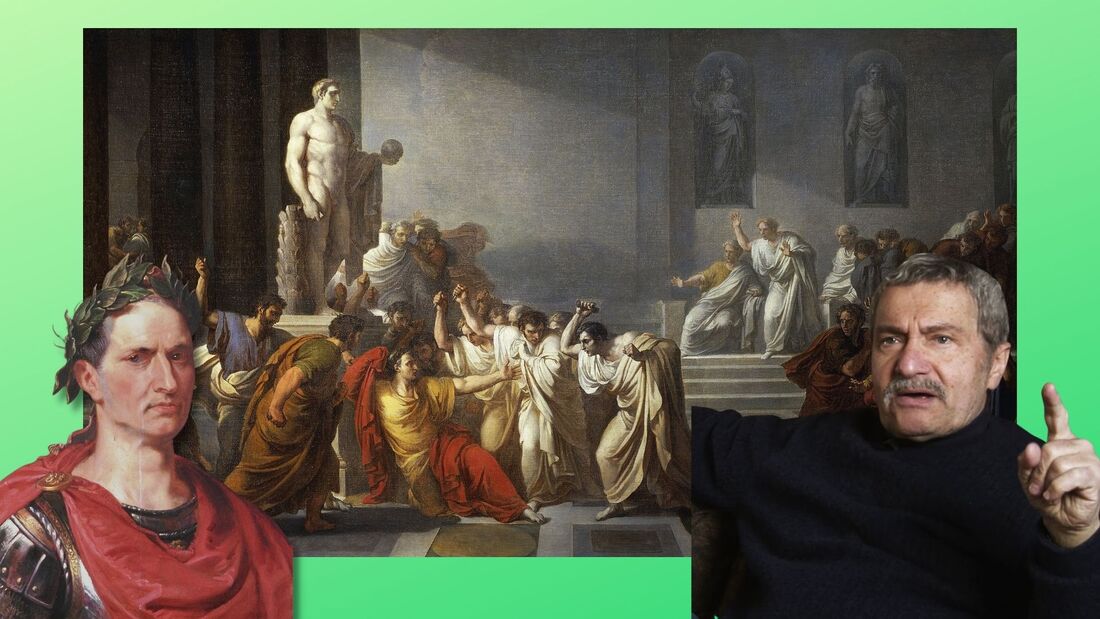|
7/6/2022 Julius Caesar: Working Class Hero or Tyrant - On Michael Parenti’s People’s History of Ancient Rome. Reviewed By: Thomas RigginsRead NowWe often hear the United States compared to ancient Rome – usually negatively. Critics of US foreign policy refer to a new Roman Empire and to Paul Bremer as a proconsul in Iraq. These references are comprehensible because Rome and its institutions, both religious and secular (especially Roman law) are part of the foundations on which so-called Western civilization is based. The founders of the United States used many Roman symbols in representing the new republic (res publica). The imperial eagle, the arrows of war, the olive branch, the idea of a Senate – even the classical architecture of Washington, DC is based on the public buildings of Rome (and Athens). Now that many elements of the right see this country as the dominant world power, the analogies with ancient Rome as a universal empire are becoming more numerous even in the popular media. Michael Parenti’s People’s History of Ancient Rome is thus both timely and relevant. Written in his usual popular and accessible style, this book will make available to a wide working-class audience an easily understandable and reliable portrait of Rome at one of its most important historical junctures: the transition from an oligarchical republic to a full-blown imperial system. The life and death of Julius Caesar is the focal point of this work. Departing from the consensus of classical scholars who refer to Caesar as a tyrant who trampled on the personal liberties and freedoms of Republican Rome symbolized by the rule of the Senate, Parenti marshals convincing evidence to support what has been the minority view – that Caesar was actually a representative of popular democratic tendencies among the Roman people and that his enemies and assassins really stood for the interests of a small elite portion of the ruling class who used the power of the Roman state for personal enrichment and the exploitation of the masses. The class struggle in Rome was basically between the optimates (the best) who represented the wealthy latifundistas (plantation owners) and the popularis (relating to the people) who tried to improve the living standards of regular citizens of the republic. 'As a popularis, Julius Caesar introduced ‘laws to better the condition of the poor,’ as [the ancient historian] Appian wrote,' Parenti points out. This is what ultimately cost him his life on March 15, 44 B.C. The optimates were also the creditor class, and Parenti remarks that their policies created 'penury and debt' that crushed average citizens. It was Caesar who tried to alleviate this suffering and prevent the loss of freedom for the debtor, actions 'upon which today’s bankruptcy laws are based' – a citizen’s freedom was to be 'inborn and unalienable.' Caesar has also been blamed for the destruction of the great library at Alexandria. Parenti shows, however, that the destruction of ancient culture, the burning of books and the closing down of libraries and educational institutions was done by the 'Christ worshipers' when they came to power. 'Though depicted as an oasis of learning amidst the brutish ignorance of the Dark Ages, the Christian church actually was the major purveyor of that ignorance.' Parenti even suggests that Caesar’s rule was 'a dictatorship of the proletarii' since he ruled against the 'plutocracy on behalf of the citizenry’s substantive interests.' And, he says Cicero, one the most dedicated of the optimates, is quoted as lamenting the fact that Caesar wanted to bestow Roman 'citizenship not merely on individuals but on entire nations and provinces.' It is no surprise then to discover that even to this day people leave flowers at the site of Caesar’s murder every March 15. Parenti also criticizes contemporary classicists who ignore the class struggles of the ancient world – seeing the masses as rabble and expressing sympathy for ancient ruling-class elites and their treatment of the common people. Parenti says he has 'tried to show [that] what we know of the common people tells us that they displayed a social consciousness and sense of justice that was usually superior to anything possessed by their would-be superiors.' Parenti lists four tenets of the ideology of the optimates which he says characterize 'all ruling propertied classes.' Namely, 1) the ruling class treats its interests as the general interest; 2) social welfare programs are bad for those who receive them as they 'undermine the moral fiber' of the poor; 3) the redistribution of wealth at the expense of the wealthy is detrimental to society as a whole; and 4) attacking the reformers and their characters is a better way to defeat reform than attacking the particular reform itself. This is an excellent book and a good read. By understanding the class struggle in ancient Rome, as presented by Parenti, we will better understand the struggle being waged in the world of today. The Assassination of Julius Caesar: A People's History of Ancient Rome By Michael Parenti New York New Press, 2003. AuthorThomas Riggins is a retired philosophy teacher (NYU, The New School of Social Research, among others) who received a PhD from the CUNY Graduate Center (1983). He has been active in the civil rights and peace movements since the 1960s when he was chairman of the Young People's Socialist League at Florida State University and also worked for CORE in voter registration in north Florida (Leon County). He has written for many online publications such as People's World and Political Affairs where he was an associate editor. He also served on the board of the Bertrand Russell Society and was president of the Corliss Lamont chapter in New York City of the American Humanist Association. He is the author of Reading the Classical Texts of Marxism. Archives July 2022
0 Comments
Leave a Reply. |
Details
Archives
July 2024
Categories
All
|

 RSS Feed
RSS Feed